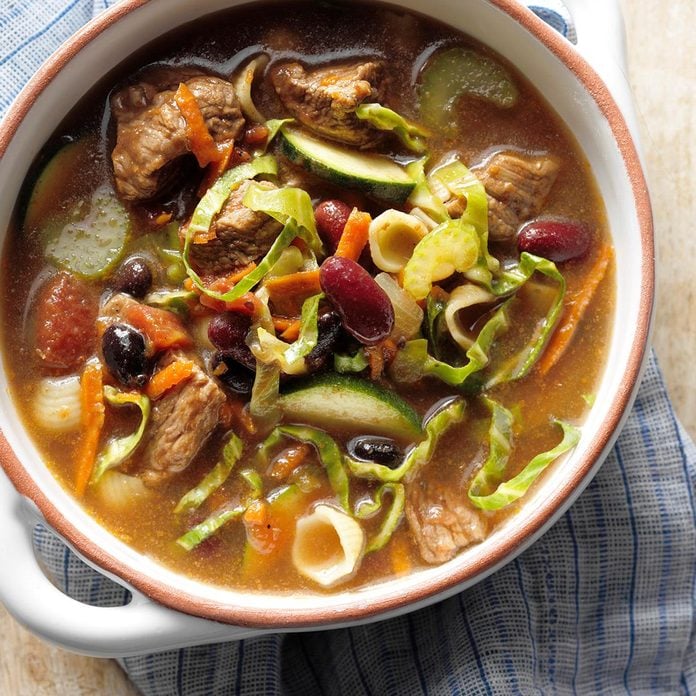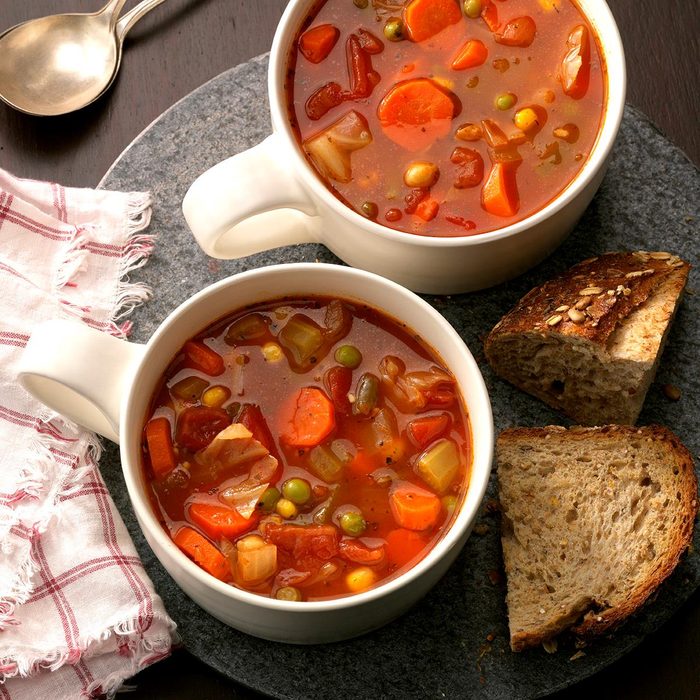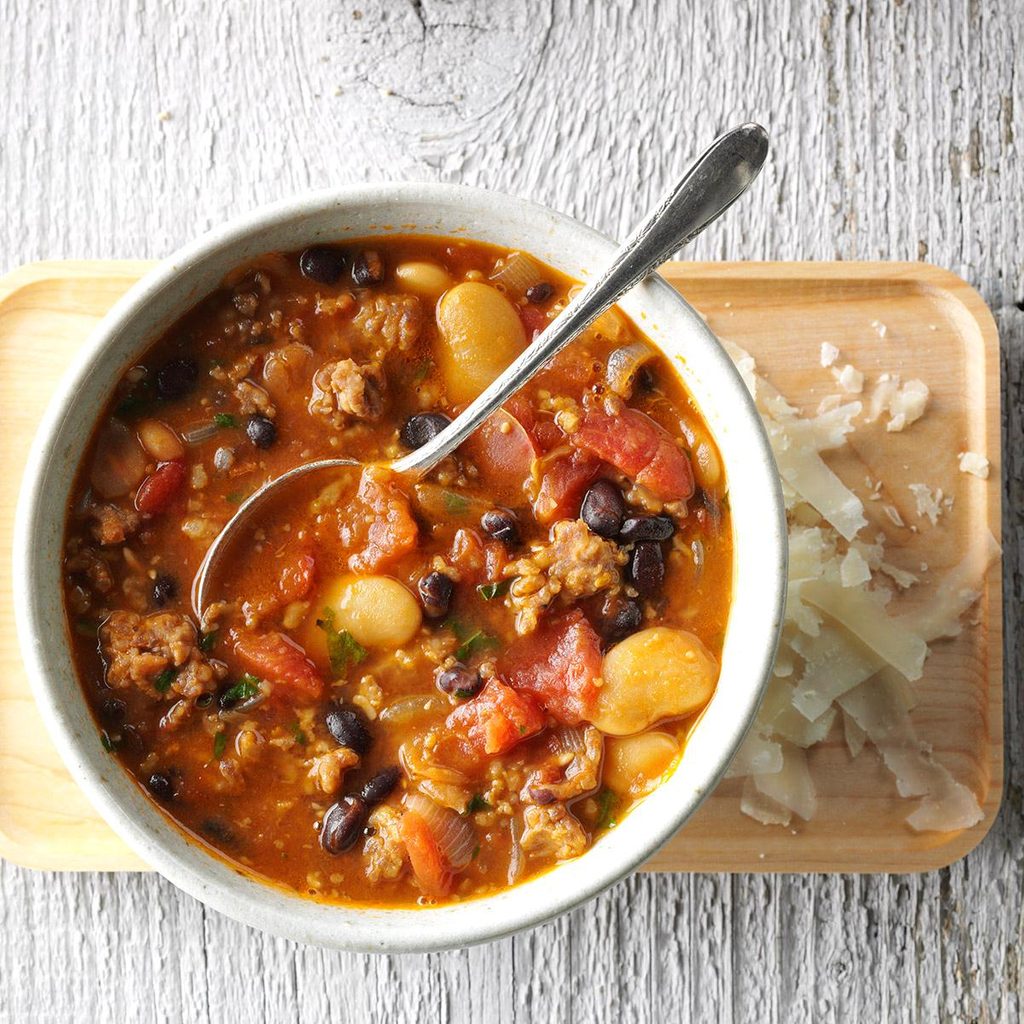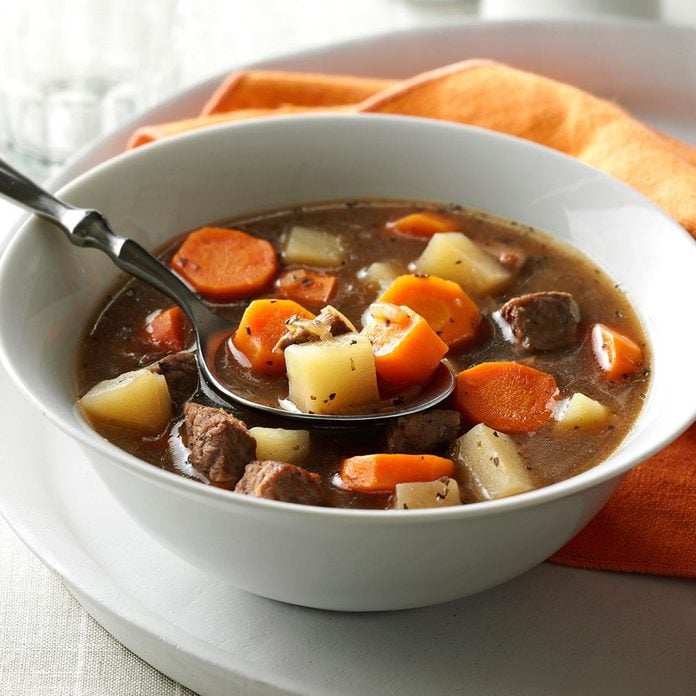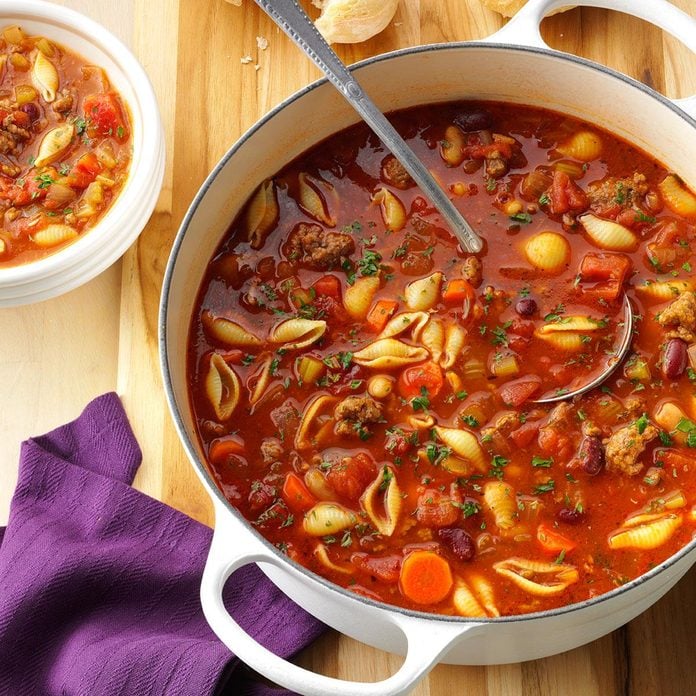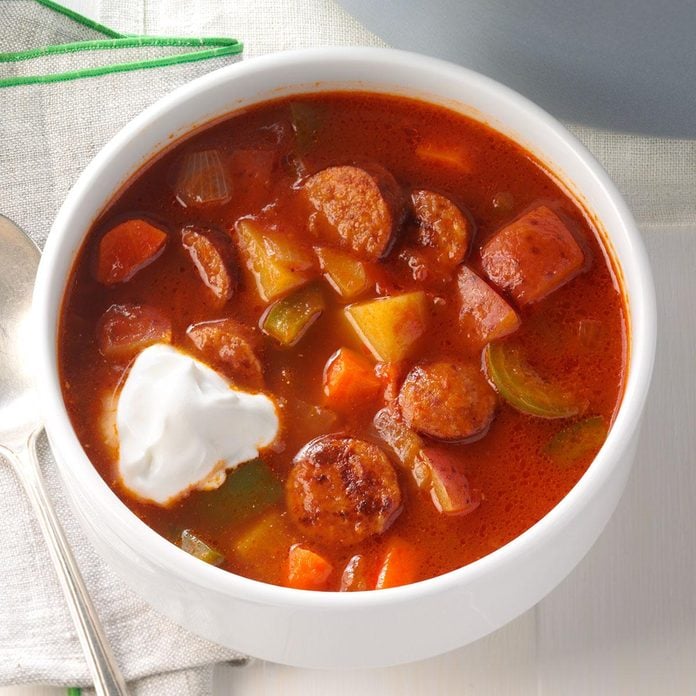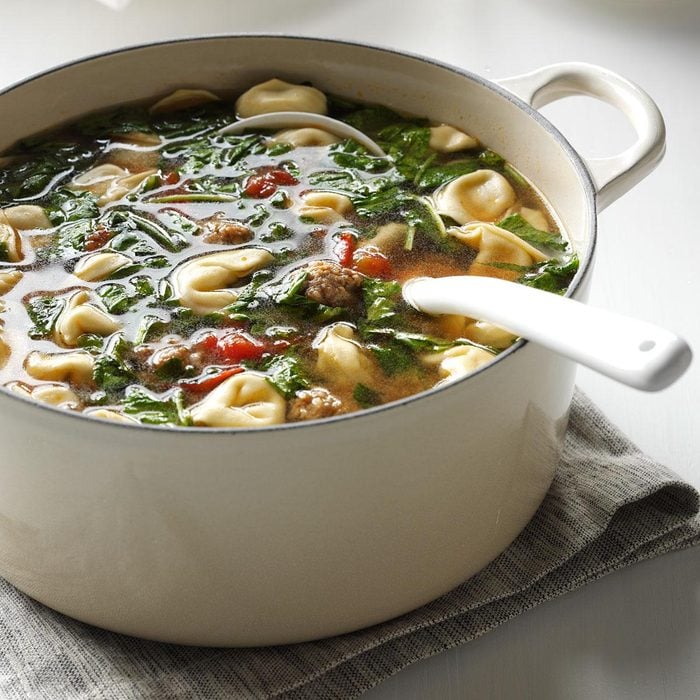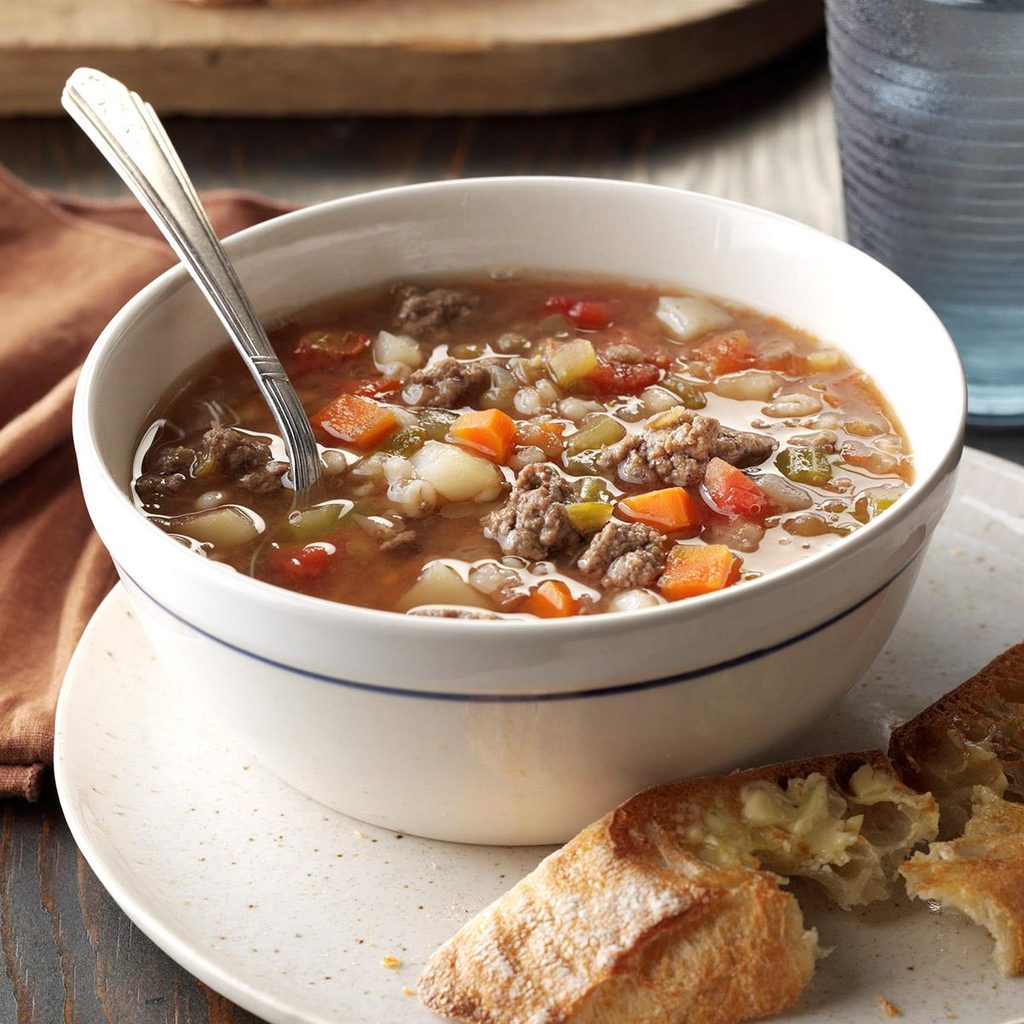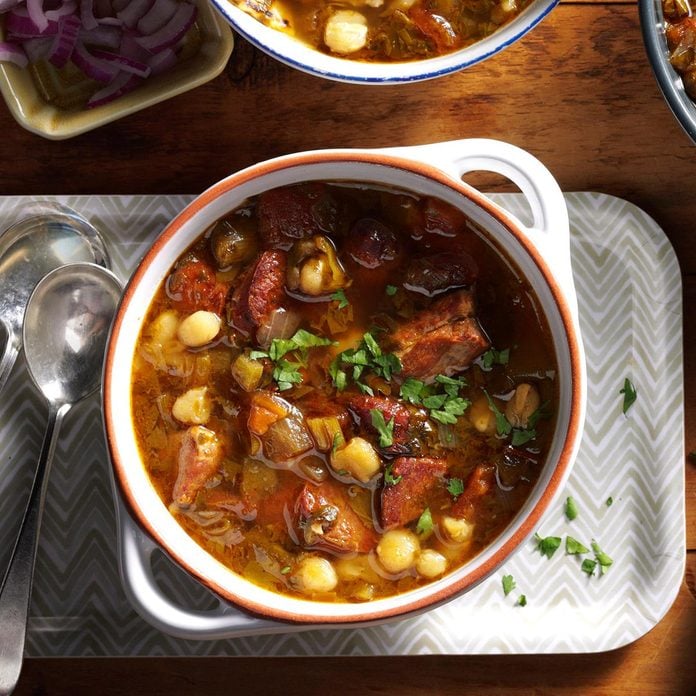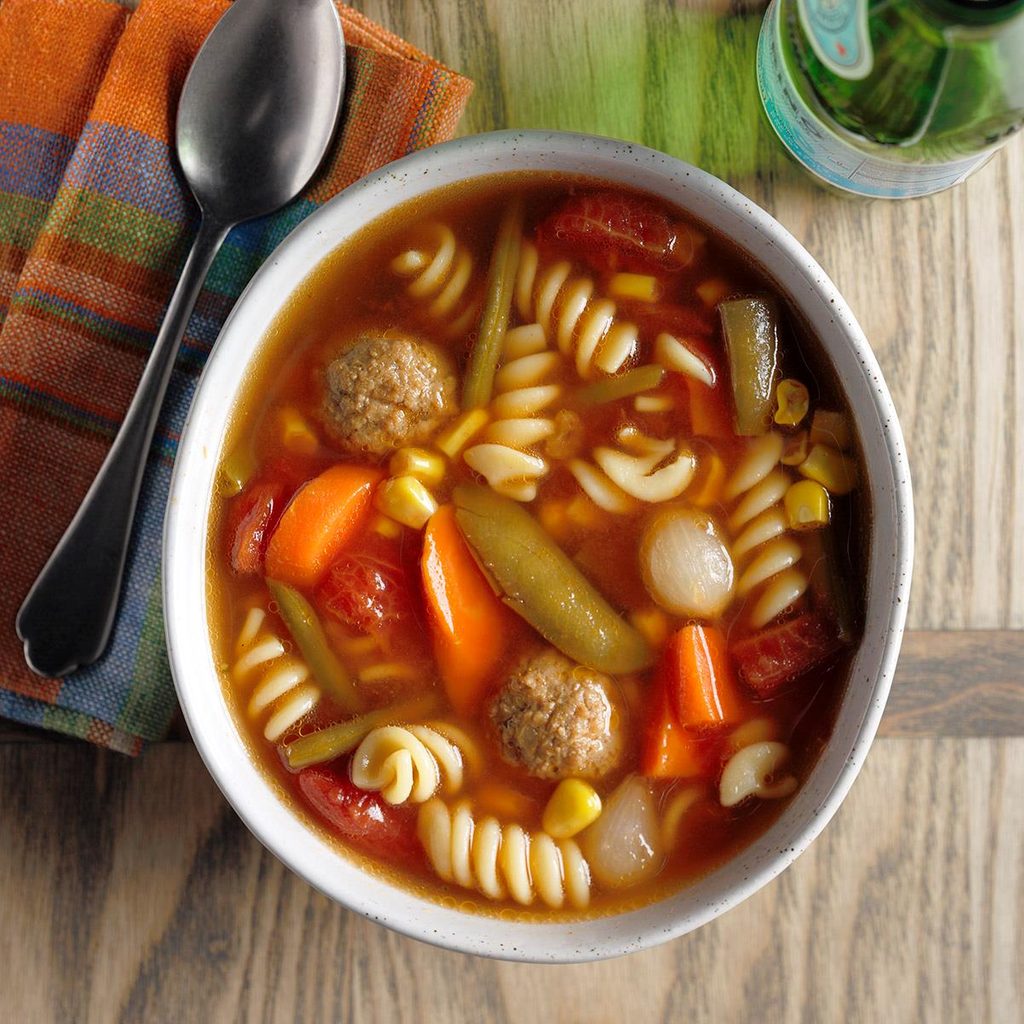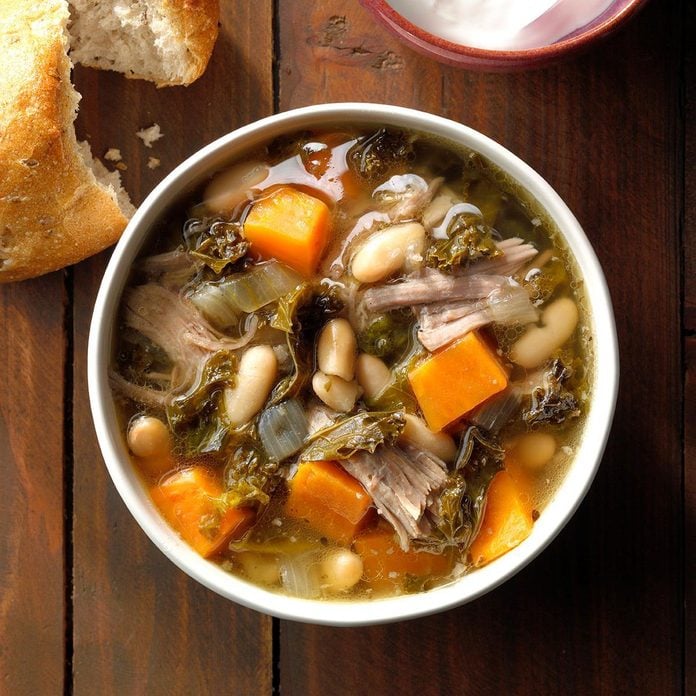Classic French Onion Soup
Enjoy my signature French onion soup the way my granddaughter Becky does. I make onion soup for her in a crock bowl complete with garlic croutons and gobs of melted Swiss cheese on top. —Lou Sansevero, Ferron, Utah
Get Recipe
Dill Chicken SoupI could eat soup for every meal of the day, all year long. I particularly like dill and spinach—they add a brightness to this light and healthy soup. —Robin Haas, Jamaica Plain, Massachusetts
Mexi-Stroni SoupIf you're a fan of classic minestrone but love bold Mexican flavors, this soup's for you! It's pumped up with spices, veggies and pasta for a filling bowl of fun. —Darlene Island, Lakewood, Washington
Hearty Vegetable SoupA friend gave me the idea to use V8 juice in vegetable soup because it provides more flavor. My best vegetable soup recipe is perfect to prepare on a crisp autumn afternoon. —Janice Steinmetz, Somers, Connecticut
Turkey Dumpling SoupSimmering up a big pot of this soup is one of my favorite holiday traditions. This is a variation on a recipe my mom made while I was growing up. My husband and children can't get enough of the tender dumplings. —Debbie Wolf, Mission Viejo, California
Southwest-Style Wedding SoupI turned leftover ground chicken into meatballs and dreamed up this cozy southwestern soup. Now my Italian family asks for it over traditional wedding soup. —Teena Petrus, Johnstown, Pennsylvania
Turkey Ginger Noodle SoupI wanted something comforting yet healthy, and ginger is my favorite spice. This recipe was a must-try for me, and it didn't disappoint. —Adina Monson, Nanaimo, British Columbia
Sausage Bean SoupYou’re moments away from a flavor-packed soup that keeps you warm on even the chilliest nights. It's just the kind of recipe we Minnesotans love. —Marlene Muckenhirn, Delano, Minnesota
Pork Edamame SoupMy husband grew up in a traditional Asian household and gives this soup high marks for authentic taste. I think the Asian hot chili sauce is what makes the dish, but any type of hot sauce would give it a delicious kick! —Kari Sue, Bend, Oregon
Italian Sausage and Zucchini SoupEveryone in my family likes this soup recipe. Sometimes I add mini farfalle because my grandchildren say the noodles look like tiny butterflies. This recipe also works in a slow cooker. —Nancy Murphy, Mount Dora, Florida
Lasagna Soup in the Slow CookerEvery fall and winter, our staff has a soup rotation. I have modified this recipe so I can prep it the night before and put it in the slow cooker in the morning. My colleagues love it! —Sharon Gerst, North Liberty, Iowa
Chicken Barley SoupNo question—this is my favorite barley soup! It's so filling that I serve it as a hearty main dish, and I have given the recipe to many of our friends and relatives. It simply tastes too good to keep to yourself! —Diana Costello, Marion, Kansas
Super Fast Mexican SoupWe take this spicy soup to rodeos on cool nights or sip it by a campfire. For toppings, try onions, avocado, cheese, jalapenos, sour cream and salsa. —Gloria Huse, Simpsonville, South Carolina
Texas Black Bean SoupThis hearty meatless stew made with convenient canned items is perfect for spicing up a family gathering on a cool day. It tastes as if it's made with love and yet it requires so little time and attention. —Pamela Scott, Garland, Texas.
The Ultimate Chicken Noodle SoupMy first Wisconsin winter was so cold, all I wanted to eat was homemade chicken noodle soup. Of all the chicken noodle soup recipes out there, this
type of soup is my favorite and is in heavy rotation from November to April. It has many incredibly devoted fans.—Gina Nistico, Denver, Colorado
Land of Enchantment PosoleMy family named this spicy soup after our state moniker, “New Mexico, Land of Enchantment.” We usually make it around Christmas when we have lots of family over…and we never have leftovers.
—Suzanne Caldwell
Artesia, New Mexico
Italian-Style Lentil SoupI cook with lentils often because they're a nutritious, inexpensive source of protein. This low-fat soup is one of my favorite ways to use them. To make it even heartier, add ground beef, cooked sausage or leftover cubed chicken. —Rachel Keller, Roanoke, Virginia
Asparagus SoupEach spring my husband takes our dogs and searches for wild asparagus. He's been so successful that I finally developed this asparagus soup recipe. We look forward to this special soup every year.—Betty Jones, Kohler, Wisconsin
The Best Chicken & Dumplings Homemade chicken and
dumplings from scratch harken back to my childhood and chilly days when we devoured those cute little balls of dough swimming in hot, rich broth. It's one of those
types of soup you'll want to eat again and again. —Erika Monroe-Williams, Scottsdale, Arizona
Veggie Thai Curry SoupMy go-to Thai restaurant inspired this curry soup. Shiitake mushrooms are my favorite, but any fresh mushroom will work. Fresh basil and lime add a burst of bright flavors. —Tre Balchowsky, Sausalito, California
Sausage & Cannellini Bean SoupHere's my reproduction of a dish from a famous Chicago eatery. We think it rivals the original. I usually cook this at least once a week. It's a tasty way to keep my lunchbox full of healthy options. —Marilyn McGinnis, Peoria, Arizona
Spicy Veggie & Lentil SoupI enjoy this recipe because it’s meatless, inexpensive and simply delicious! You can substitute any vegetables you like—it’s all a matter of preference. Serve warm pita bread on the side. —Geraldine Hennessey, Glendale, New York
Vegetable Steak SoupYour crew will chase away winter's chill with a spoon when you cook up this hearty soup. It has such a rich flavor...and it's full of nutritious vegetables and chunks of tender steak. —Brigitte Schultz, Barstow, California
Seafood CioppinoIf you're looking for a great seafood recipe for your slow cooker, this classic fish stew is just the ticket. It's brimming with clams, crab, fish and shrimp, and it is fancy enough to be an elegant meal. —Lisa Moriarty, Wilton, New Hampshire
Thai Chicken Noodle SoupThis slow-cooker soup is a semi-homemade version that coaxes all the flavor out of a rotisserie chicken. The prep work for this can be done the day before so you can toss it into the slow cooker with ease. —Beth Jacobson, Milwaukee, Wisconsin
Chipotle Butternut Squash SoupMy hearty soup uses herbs and vegetables from the garden along with convenient pantry items, so it’s easy, fast and mostly fresh. Your family will devour it. —Roxanne Chan, Albany, California
Bacon-Beef Barley SoupHere’s a robust dish that’s perfect for hungry teenagers! Served over creamy mashed potatoes, this quick, comforting soup really hits the spot. —Cathy Peterson, Menominee, Michigan
Lemon Chicken & Rice SoupYears ago, I fell hard for a lemony Greek soup at Panera Bread. It was just a special back then, but I re-created it at home so we could eat it whenever a craving hit! —Kristin Cherry, Bothell, Washington
Carolina Shrimp SoupFresh shrimp from the Carolina coast is one of our favorite foods. We add kale, garlic, red peppers and black-eyed peas to complete this wholesome, filling soup. —Mary Marlowe Leverette, Columbia, South Carolina
Sausage & Greens SoupI always have an abundance of fresh vegetables on hand, so I wanted to create a delicious soup to enjoy during the colder months. I think I found a winner! —Angie Pitts, Charleston, South Carolina.
One-Pot Spinach Beef SoupMy idea of a winning weeknight meal is this beefy soup simmering in one big pot. Grate some Parmesan and pass the saltines. —Julie Davis, Jacksonville, Florida
Hearty Pasta FagioliHere's a convenient spin on a classic Italian favorite. Spaghetti sauce and canned broth form the flavorful base. —Cindy Garland, Limestone, Tennessee
Minestrone with TurkeyI remember my mom making this soup; now I make it for my kids as often as I can. It's a good way to use up leftover vegetables. Sometimes I add a can of rinsed and drained kidney or garbanzo beans. —Angela Goodman, Kaneohe, Hawaii
Beef Lentil SoupYou can prepare this soup as the main course in a hearty lunch or dinner. On cold winter evenings here in New England, I've often enjoyed sipping a steaming mugful in front of our fireplacel. —Guy Turnbull, Arlington, Massachusetts
Maryland-Style Crab SoupTry this hearty soup that incorporates the best of vegetable soup and flavorful crab. I break whole crabs and claws into pieces and drop them into the soup to cook, then serve it with saltine crackers and a cold beer. —Freelove Knott, Palm Bay, Florida
Andouille Sausage SoupI make a soup every football Sunday. I came up with this recipe because I wanted to use lots of vegetables to keep it healthy, but wanted it to be interesting. My wife suggested adding the andouille and now it's one of my favorite andouille sausage recipes. —Steven Thurner, Janesville, Wisconsin
Coconut Curry Vegetable SoupI've been a vegetarian since high school, so modifying recipes to fit my meatless requirements is a challenge I enjoy. This soup tastes rich and creamy and is packed with nutrients! —Carissa Sumner, Washington, DC
Hearty Vegetable Lentil SoupMy mother has diabetes, so I often prepare this dish for her. I wanted a hearty soup that hits the spot on cold autumn nights, so I paired the lentils with turkey bacon and a handful of spices. —Nicole Hopping, Pinole, California.
Spicy Sausage Soup with TortelliniThis soup is such a family treasure, both my daughters asked for the recipe when they moved out on their own. I cook the tortellini separately, but you can let it plump up in the soup broth, too. —Cynthia Krakowiak, Langhorne, Pennsylvania
Hearty Homemade Chicken Noodle SoupThis satisfying soup with a hint of cayenne is brimming with vegetables, chicken and noodles. The recipe is from my father-in-law, but I tweaked it to make it my own. —Norma Reynolds, Overland Park, Kansas
Coconut Curry Chicken SoupSimilar to a Vietnamese pho rice noodle soup, this red coconut curry chicken soup packs big flavor and a bit of heat. The crisp raw vegetables help cool things down. —Monnie Norasing, Mansfield, Texas
Spicy Kielbasa SoupRed pepper flakes bring a little zip to this hearty soup that's full of good-for-you ingredients. Should you have any left over, this soup is fantastic reheated, after flavors have had time to blend. I like to serve steaming bowls with rye bread. —Carol Custer, Clifton Park, New York
Beef Barley Lentil SoupI serve this soup often to family and friends on cold nights, along with homemade rolls and a green salad. For variety, you can substitute jicama for the potatoes. —Judy Metzentine, The Dalles, Oregon
So-Easy-Yet-Delicious Onion SoupTopped with a slice of cheesy toast hot from the broiler, homemade onion soup is guaranteed to please. Add a green side salad for a complete meal. —Hildy Schlegel, Addison, New York
Anaheim Chicken Tortilla SoupPut a little spice in your menu with my favorite Anaheim pepper recipe. The peppers, jalapenos and cayenne heat up this full-flavored tortilla soup. —Johnna Johnson, Scottsdale, Arizona
Easy Pork PosoleLooking for a meal in a bowl? Sit down to a Mexican classic full of cubed pork, sliced sausage, hominy and more. It all goes into the slow cooker, so you can come home at night to a table-ready dinner. —Greg Fontenot, The Woodlands, Texas
Shrimp Pad Thai SoupPad thai is one of my favorite dishes, but it is often loaded with extra calories. This soup is a healthier option that has all the flavor of traditional versions. —Julie Merriman, Seattle, Washington.
Veggie Meatball SoupIt's a snap to put together this hearty soup before I leave for work. I just add cooked pasta when I get home, and I have a few minutes to relax before supper is ready. —Charla Tinney, Tyrone, Oklahoma
Italian Shredded Pork StewNeed a warm meal for a chilly night? Throw together this slow-cooked stew that’s brightened with fresh sweet potatoes, kale and Italian seasoning. The shredded pork is so tender, you’re going to want to make this dish all season long. —Robin Jungers, Campbellsport, Wisconsin




